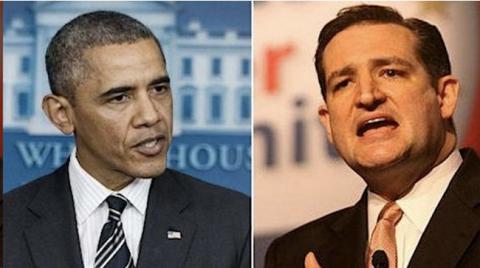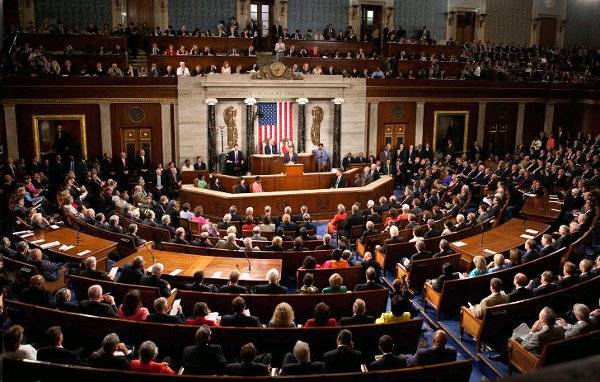Government Shutdown: A Win for Obama (and Cruz)

From The Root and our content partner, New America Media:
Why the president and his Tea Party rival both have something to gain in this government face-off.
(The Root) -- With each passing "crisis" in the zero-sum game of congressional politics, we've gotten used to sorting out the winners and losers of every battle. But as September's round of Washington's annual budget fight tightens up -- and a government shutdown [has occurred] -- what we have, so far, is a win-win: The Tea Party's Sen. Ted Cruz has the attention he craves, and President Barack Obama stays "covered."
But what, exactly, do they get out of the deal?
Last week Cruz faux-filibustered a House bill to "defund" Obamacare -- a bill that he supported -- and then voted against it, anyway. The result was an enhanced reputation on both sides of the aisle for being "an incredibly bright guy who's an arrogant jerk."
Even Republican colleagues, like Tennessee Sen. Bob Corker, took to the Senate floor to accuse Sen. Cruz of pushing bad policy that boiled down to a me-first media campaign.
But Cruz -- who headlined Fox News Sunday last week and Meet the Press this Sunday -- is playing the Tea Party lead-dog role for everything it's worth. And all you need to know about why he's done what he's doing can be found in Friday's new poll from Public Policy Polling, showing that Cruz has boosted his standing among his political base to the point that he's now GOP primary voters' "top choice to be their candidate for president in 2016."
He's relished the criticism because as Mediaite's Noah Rothman points out, as long as Congress is held in low esteem by the public, picking a fight with his colleagues is Cruz's way of "making all the right enemies" on the way to a future run for the White House.
Obama, on the other hand, needs a reboot.
He's never quite sold the idea that the Affordable Care Act will help millions of uninsured Americans secure coverage while simultaneously lowering premiums for those who're already insured and shrink the overall cost of health care as a share of GDP.
Even those supporting Obamacare aren't quite sure that it will turn out as advertised.
Now, though, Cruz's crusade led to a government shutdown on the same day that Obamacare's state health insurance exchanges are scheduled to launch -- giving the president a window to spotlight the issue again. And so far, he's made the most of it.
He told a Maryland crowd last Thursday that once Obamacare launches, they'll want to "get covered." And he tweaked opponents by predicting, wryly, that "once it's working really well, I guarantee you they will not call it Obamacare."

Don't expect one speech to turn the tables in the president's favor, but that's a lot better than his old 2009 mantra: "bending the cost curve."
So what happens next? If you're like most people, you've got more pressing things to do than follow the play-by-play in Congress. But to recap: House Republicans passed a bill to fund the government -- but not Obamacare. The Democratic-controlled Senate rejected it Friday, sending a bill back to the House without any provision touching Obamacare. Then, in the wee hours of Sunday morning, the House passed what they called a compromise bill, proposing only to delay Obamacare for a year, instead of defunding it.
Which is like saying they won't break Obama's legs; they'll just break one of his thumbs.
Cruz and Obama might still wind up as culprits if budget gridlock turns into a prolonged shutdown or another debt ceiling crisis in October -- especially if it turns out like 2011, when markets dipped after Standard & Poor's downgraded the nation's credit rating.
But for the moment, Obama -- who's never liberal enough for Democrats and never gets the benefit of the doubt from Republicans -- now has a foil who's making it easier for him to stand up for his health care initiative and outline his budget priorities. And Cruz gets to show that he's first among equals when it comes to opposing anything linked to Obama.
Meanwhile, federal employees will be furloughed, any salary that they forfeit won't be spent in a still-fragile economy, and Congress's inability to make a deal will eventually threaten another loss of confidence in the markets.
For everyone else, in other words, it's a lose-lose.
Author Bio:
David Swerdlick is a contributing editor at The Root.































































































































































































































































































































